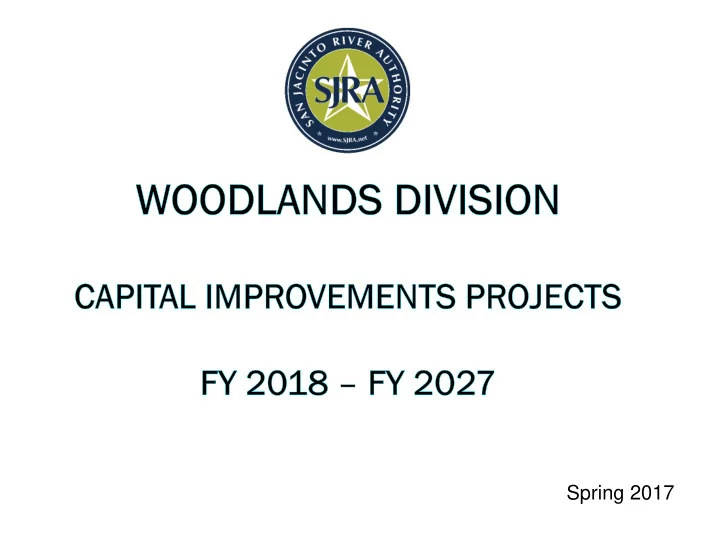

Spring 2017
The Woodlands Wastewater 3 wastewater treatment plants 30 lift stations >50 miles of sewer mains >1,100 manholes >20 miles of force main Water 5 water plants 38 water wells 6 elevated storage tanks 8 ground storage tanks >126 miles of water mains
Contents Woodlands Systems CIP Goals and Development Proposed FY 2017 – FY 2027 CIP Previous CIP Comparison
Capital Improvement Program Goals Meet service level expectations Manage aging infrastructure Extend useful life Reduce risk of system failure Provide Capacity Meet needs of future growth Meet regulatory requirements
How Projects are Determined Asset Management Risk of Failure = Likelihood of Failure x Consequence of Failure Age / Condition assessment Repair / rehabilitation history Staff inspections Study results New development Sixth & Final Accounting – Capacity projects Planned and unplanned development / redevelopment Upcoming regulatory changes
Asset Priority Based Risk Analysis
Assets are Prioritized Based on Risk of Failure Risk of Failure = Consequence of Failure x Likelihood of Failure How Severe Are the What is the Likelihood Consequences of Failure? of Failure? Health & Safety Public image Age Material • • • • Loss of service Workforce stress Physical condition Weather exposure • • • • Regulatory Damage to property Repair history Corrosive environment • • • • compliance Loss of revenue Capacity and Functionality • • • Environmental impact • Repair costs utilization • Community disruption • 9
Sample Performance Evaluation Wastewater Collection System Capacity to convey 2027 dry weather flows (utilization less than 90%) Capacity to convey 2027 flows resulting from a 5-year / 24-hour design storm Flow minimum 4-feet below the manhole cover is maintained during peak flows Lift station flows within 75% of available firm capacity Lift station wet well detention time < 30-minutes at average flows
Other Performance Factors Frequency of sanitary sewer overflows Frequency of odor complaints WWTF effluent quality data (Discharge Monitoring Report) incidences of below average performance Number of corrective maintenance work orders issued per asset Number of work orders issued per water and wastewater system asset group per year: Total, Corrective, and Preventative
Water Main Pipe Material / Age Profile
Gravity Sewer Main Pipe Age Profile
(Age Based Evaluation) RCP – Reinforced Concrete Pipe DI – Ductile Iron
* * Industry Stated Pipe Service Life
(Age Based Evaluation)
* * Industry Stated Pipe Service Life
(Age Based Evaluation)
* * Industry Stated Pipe Service Life
Sample Risk Assessment
Sample Results Gravity Mains
Resulting in a CIP PROJECT NAME PROJECT ID FISCAL YEAR DIVISION Water Plant No. 4 Ground Storage Tank No. 2 WA4GT2 2019 Woodlands PROJECT DESCRIPTION/JUSTIFICATION: PROJECT MAP/PICTURE An additional Ground Storage Tank (GST) will be required at Water Plant No. 4 to provide additional storage capability. Water plants with only one tank cannot be kept in operation if the tank is out of service. Building a second tank will allow for continuous use of the water plant when maintenance or repairs are being made to either tank. Water model analysis demonstrates a critical need for continuous operation of Water Plant No. 4. If the plant is not operational, large areas within the upper pressure plane would be without water. Proposed GST No. 2 shall have a storage capacity of 2.0 million gallons, equal to GST No. 1, providing additional storage capability. Two equally sized tanks will be sufficient to meet peak day demands, will simplify control settings, and will minimize call-to-run for surface water and ground water supplies, providing less wear on the supply facilities. PROJECT SCHEDULE DELIVERY FUNDING Initiate Cons. Selection 2019 DBB O&M PSA/WO Issued: 2019 CMAR Bonds Final Proposal Docs: 2019 CSP R&R Proposals/Bids Received: 2019 Other Other Const. Contract to Board: 2020 Capacity Substantial Completion: 2021 Capitalized Expensed BUDGET * TOTAL PREVIOUS 2018 2019 2020 2021 2022 2023 2024 2025 2026 2027 Planning/Permitting/PER $ 310,000 $ 310,000 Engineering/Design $ 310,000 $ 310,000 Construction $ 3,103,000 $ 3,103,000 CPS, CM&I, and CMT $ 310,000 $ 310,000 Land Acquisition $ - Equipment Purchase $ - Total $ 4,033,000 $ - $ - $ 620,000 $ 3,413,000 $ - $ - $ - $ - $ - $ - $ - * Budget includes contingency
10 Year CIP Wet Weather Flow Management
Projected 2-Hour Peak Flows to WWTF No. 1
Wet Weather Management
Proposed Path Forward for I&I Reduction Project Start Complete Complete Bear Branch trunk line, 2018 2020 aeration basins, and sludge handling Conduct minimum 9-months of retail 2020 2022 and wholesale flow monitoring and evaluation of data Identify I&I reduction areas and re- 2022 2023 evaluate CIP Develop new CIP 2023 2023 Implement CIP I&I reduction efforts 2024 ongoing I&I – Inflow & Infiltration
Proposed FY 2018 – FY 2027 CIP
PLEASE REFER TO THE SUMMARY SHEETS PROVIDED.
Comparison to FY 2017 – FY 2021 CIP
FY 2017 vs FY 2018 (Non-Capacity & Non-Bonds) Water (FY17) Water (FY18) 2018 - $1,996,500 2018 - $2,207,700 2019 - $ 684,000 2019 - $1,157,000 2020 - $2,222,000 2020 - $1,822,000 2021 - $1,313,000 2021 - $1,905,000 Wastewater (FY17) Wastewater (FY18) 2018 - $12,931,000 2018 - $4,854,000 2019 - $ 2,678,000 2019 - $5,923,000 2020 - $18,150,000 2020 - $3,604,000 2021 - $ 3,060,000 2021 - $7,549,000
Questions?
Recommend
More recommend